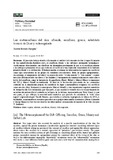Mostrar el registro sencillo del ítem
Las metamorfosis del don: ofrenda, sacrificio, gracia, substituto técnico de Dios y vida regalada
| dc.creator | Beriain Rázquin, Josetxo | es_ES |
| dc.date.accessioned | 2019-01-28T08:51:47Z | |
| dc.date.available | 2019-01-28T08:51:47Z | |
| dc.date.issued | 2017 | |
| dc.identifier.issn | 1130-8001 (Print) | |
| dc.identifier.issn | 1988-3129 (Electronic) | |
| dc.identifier.uri | https://hdl.handle.net/2454/32112 | |
| dc.description.abstract | El presente trabajo aborda críticamente el análisis del concepto de sacrificio frente a los enfoques puramente taxonómico-clasificatorios obsesionados con clasificar sin determinar previamente lo que es el sacrificio o frente a los enfoques puramente éticos que reducen el sacrificio a una expresión inmolatoria de la barbarie primitiva frente a la civilización. El trabajo analiza el sistema de intercambio de regalos no sacrificial como algo característico de los grupos de cazadores y recolectores. Entre los grupos agropastorales, sin embargo, el surgimiento del altar y la separación entre “el otro mundo” y “este mundo”, crearán una diferencia clara diferencia entre los dioses y los hombres y una manera de comunicación nueva entre ellos a través del sacrificio, como lo han puesto de manifiesto, Henry Hubert y Marcel Mauss a comienzos del XX y Marcel Hénaff recientemente. El final de la fascinación procedente de las ceremonias centradas en la inmolación propias del sacrificio da lugar a metamorfosis religiosas del sacrificio como oración (Guy Stroumsa) y como gracia (Marcel Hénaff), a dos importantes registros narrativos de interpretación del cristianismo, por una parte, el que analiza la variante ética de un movimiento de sacralización antisacrificial centrado en la figura de la víctima, representado por René Girad, y, por otra parte, el que subraya la novedad mito-simbólica que procede de considerar la “vida como regalo”, representado por Talcott Parsons, que redefine y actualiza la propuesta de Mauss de 1924, y, finalmente, a metamorfosis seculares presentes en el propio intercambio económico (Niklas Luhmann y Georg Simmel) y last but not least en los intercambios ceremoniales del mundo de la vida (Jacques T. Godbout). | es_ES |
| dc.description.abstract | This paper takes into account the analysis of a specific manifestation of the don, the sacrifice, against the purely taxonomic-classificatory approaches worried classifying different types of sacrifice without setting up previously the concept of sacrifice and against the ethical approaches which reduce the sacrifice to a violent expression of “primitive”, precivilized cruelty. The paper analyzes the non-sacrifitial system of gift Exchange as something proper of the hunter and gatherer groups, meanwhile among the agropastoral groups the combined effect of the rising of the altar as well as the differentiation among the “thiswordly” orientation versus the “otherworldly” orientation will create a clear difference betwen gods and men and a new way of communication among these XXth Century and Marcel Hénnaf recently. The end of the fascination in ritual practices centered in inmolations will have several relevant outcomes: First, the shift from sacrifice into praying (Guy Stroumsa); second, the rising of two important narratives within Christianity, on the one hand, the ethical interpretation of an antisacrifitial sacralization mouvement centered in the role of the victim, represented by René Girard, and, on the other hand, the mythical-symbolical interpretation which holds “life as a Gift”, represented by Talcott Parsons whose proposal revisit and updates the one from Mauss stated in 1924.; third, secular metamorphosis raised within the economic exchange itself (Niklas Luhmann) and last but not least, fourtly, the persistence of ceremonial exchanges within the life world (Jacques T. Godbout). | en |
| dc.format.extent | 23 p. | |
| dc.format.mimetype | application/pdf | en |
| dc.language.iso | spa | en |
| dc.publisher | Universidad Complutense de Madrid | es_ES |
| dc.relation.ispartof | Política y Sociedad, 54(3) 2017: 645-667 | es_ES |
| dc.rights | Creative Commons Attribution 4.0 International (CC BY 4.0) | en |
| dc.rights.uri | https://creativecommons.org/licenses/by/4.0/ | |
| dc.subject | Regalo | es_ES |
| dc.subject | Ofrenda | es_ES |
| dc.subject | Sacrificio | es_ES |
| dc.subject | Dinero | es_ES |
| dc.subject | Vida regalada | es_ES |
| dc.title | Las metamorfosis del don: ofrenda, sacrificio, gracia, substituto técnico de Dios y vida regalada | es_ES |
| dc.type | info:eu-repo/semantics/article | en |
| dc.type | Artículo / Artikulua | es |
| dc.contributor.department | Sociología | es_ES |
| dc.contributor.department | Soziologia | eu |
| dc.rights.accessRights | info:eu-repo/semantics/openAccess | en |
| dc.rights.accessRights | Acceso abierto / Sarbide irekia | es |
| dc.identifier.doi | 10.5209/poso.54350 | |
| dc.relation.publisherversion | https://doi.org/10.5209/poso.54350 | |
| dc.type.version | info:eu-repo/semantics/publishedVersion | en |
| dc.type.version | Versión publicada / Argitaratu den bertsioa | es |



